| |||||
| Decades: | |||||
|---|---|---|---|---|---|
| See also: | |||||
The following lists events that happened during 2014 in Cuba .
| |||||
| Decades: | |||||
|---|---|---|---|---|---|
| See also: | |||||
The following lists events that happened during 2014 in Cuba .

The economy of Cuba is a planned economy dominated by state-run enterprises. In the 1990s, the ruling Communist Party of Cuba encouraged the formation of worker co-operatives and self-employment. In the late 2010s, private property and free-market rights along with foreign direct investment were granted by the 2018 Cuban constitution. Foreign direct investment in various Cuban economic sectors increased before 2018. As of 2021, Cuba's private sector is allowed to operate in most sectors of the economy. As of 2023, public-sector employment was 65%, and private-sector employment was 35%, compared to the 2000 ratio of 76% to 23% and the 1981 ratio of 91% to 8%. Investment is restricted and requires approval by the government. In 2021, Cuba ranked 83rd out of 191 on the Human Development Index in the high human development category. As of 2012, the country's public debt comprised 35.3% of GDP, inflation (CDP) was 5.5%, and GDP growth was 3%. Housing and transportation costs are low. Cubans receive government-subsidized education, healthcare, and food subsidies.

Cuba's foreign policy has been fluid throughout history depending on world events and other variables, including relations with the United States. Without massive Soviet subsidies and its primary trading partner, Cuba became increasingly isolated in the late 1980s and early 1990s after the fall of the USSR and the end of the Cold War, but Cuba opened up more with the rest of the world again starting in the late 1990s when they have since entered bilateral co-operation with several South American countries, most notably Venezuela and Bolivia beginning in the late 1990s, especially after the Venezuela election of Hugo Chávez in 1999, who became a staunch ally of Castro's Cuba. The United States used to stick to a policy of isolating Cuba until December 2014, when Barack Obama announced a new policy of diplomatic and economic engagement. The European Union accuses Cuba of "continuing flagrant violation of human rights and fundamental freedoms". Cuba has developed a growing relationship with the People's Republic of China and Russia. Cuba provided civilian assistance workers – principally medical – to more than 20 countries. More than one million exiles have escaped to foreign countries. Cuba's present foreign minister is Bruno Rodríguez Parrilla.
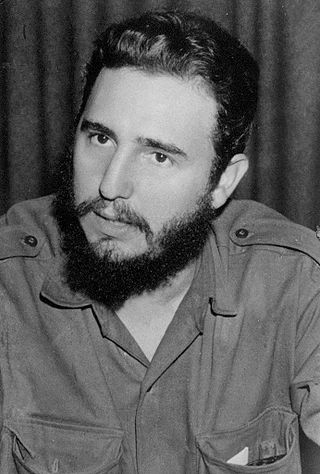
Fidel Alejandro Castro Ruz was a Cuban revolutionary and politician who was the leader of Cuba from 1959 to 2008, serving as the prime minister of Cuba from 1959 to 1976 and president from 1976 to 2008. Ideologically a Marxist–Leninist and Cuban nationalist, he also served as the first secretary of the Communist Party of Cuba from 1965 until 2011. Under his administration, Cuba became a one-party communist state; industry and business were nationalized, and socialist reforms were implemented throughout society.
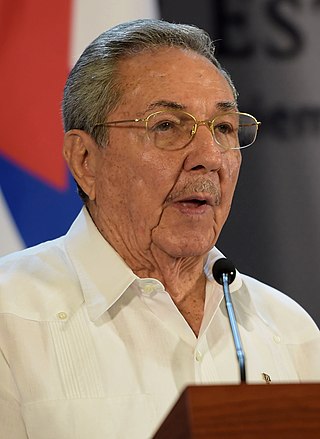
Raúl Modesto Castro Ruz is a Cuban retired politician and general who served as the first secretary of the Communist Party of Cuba, the most senior position in the one-party communist state, from 2011 to 2021, and President of Cuba between 2008 and 2018, succeeding his brother Fidel Castro.
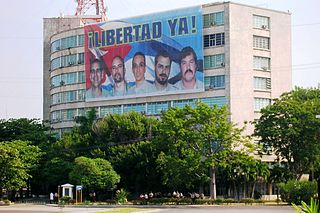
The Cuban Five, also known as the Miami Five, are five Cuban intelligence officers who were arrested in September 1998 and later convicted in Miami of conspiracy to commit espionage, conspiracy to commit murder, acting as an agent of a foreign government, and other illegal activities in the United States. The Five were in the United States to observe and infiltrate the Cuban-American groups Alpha 66, the F4 Commandos, the Cuban American National Foundation, and Brothers to the Rescue. They were part of La Red Avispa composed of at least 27 Cuban spies.
The Intelligence Directorate, commonly known as G2 and, until 1989, named Dirección General de Inteligencia (DGI), is the main state intelligence agency of the government of Cuba. The DI was founded in late 1961 by Cuba's Ministry of the Interior shortly after the Cuban Revolution. The DI is responsible for all foreign intelligence collection and comprises six divisions divided into two categories, which are the Operational Divisions and the Support Divisions.
Corps General Abelardo Colomé Ibarra was a Vice President of the Council of State of Cuba and the Cuban Minister of the Interior, serving in the latter position from 1989, until his retirement in October, 2015. Known as Furry he first laid the foundations of State Security in 1959.

Hotel Tryp Habana Libre is one of the larger hotels in Cuba, situated in Vedado, Havana. The hotel has 572 rooms in a 25-floor tower at Calle 23 and Calle L. Opened in 1958 as the Habana Hilton, the hotel famously served as the residence of Fidel Castro and other revolutionaries throughout 1959, after their capture of Havana.

Cuba, officially the Republic of Cuba, is an island country, comprising the island of Cuba, Isla de la Juventud, and 4,195 islands, islets and cays surrounding the main island. It is located where the northern Caribbean Sea, Gulf of Mexico, and Atlantic Ocean meet. Cuba is located east of the Yucatán Peninsula (Mexico), south of both Florida and the Bahamas, west of Hispaniola, and north of Jamaica and the Cayman Islands. Havana is the largest city and capital. Cuba is the third-most populous country in the Caribbean after Haiti and the Dominican Republic, with about 10 million inhabitants. It is the largest country in the Caribbean by area.

Cuba and the United States restored diplomatic relations on July 20, 2015, after relations had been severed in 1961 during the Cold War. U.S. diplomatic representation in Cuba is handled by the United States Embassy in Havana, and there is a similar Cuban Embassy in Washington, D.C. The United States, however, continues to maintain its commercial, economic, and financial embargo, making it illegal for U.S. corporations to do business with Cuba.
Ramiro Valdés Menéndez is a Cuban politician. He became a Government Vice President in the 2009 shake-up by Raúl Castro.

Cuba–Russia relations reflect the political, economic and cultural exchanges between Cuba and Russia. These countries have had close cooperation since the days of the Soviet Union. Russia has an embassy in Havana and a consulate-general in Santiago de Cuba. Cuba has an embassy in Moscow and an honorary consulate in Saint Petersburg. Around 55,000 people of Russian descent live in Cuba.

The Vishnya class, Soviet designation Project 864, are a group of intelligence collection ships built for the Soviet Navy in the 1980s. The ships continue in service with the Russian Navy. The Russian Navy operates seven of these ships.

Miguel Díaz-Canel Bermúdez is a Cuban politician and engineer. He has served as the 8th First Secretary of the Communist Party of Cuba since 2021 and as the 17th President of Cuba since 2019. In his capacity as First Secretary he is the most powerful person in the Cuban government.
Marielitos is the name given to the Cuban immigrants that left Cuba from the Port of Mariel in 1980. Approximately 135,000 people left the country to the United States from April to September in what became known as the Mariel boatlift.

The Embassy of the United States of America in Havana is the United States of America's diplomatic mission in Cuba. On January 3, 1961, U.S. President Dwight D. Eisenhower severed relations following the Cuban Revolution of the 1950s. In 1977, U.S. President Jimmy Carter and Cuban leader Fidel Castro signed an Interests Sections Agreement that permitted each government to operate from its former embassy in Havana and Washington D.C., which were called Interests Sections; they were prohibited from flying their respective flags. Cuban President Raúl Castro and U.S. President Barack Obama restored full diplomatic connections on July 20, 2015.
Rolando Sarraff Trujillo is a Cuban intelligence officer who was convicted for espionage for the United States Central Intelligence Agency.
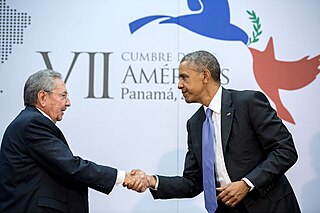
The Cuban thaw was the normalization of Cuba–United States relations that began in December 2014, ending a 54-year stretch of hostility between the nations. In March 2016, Barack Obama became the first U.S. president to visit Cuba since Calvin Coolidge in 1928. The normalization of relations between the United States and Cuba was relatively short lived, with much of the diplomatic progress that was made later being undone by the Trump administration.
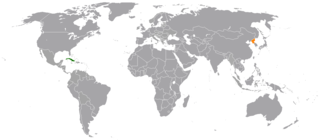
Cuba–North Korea relations are the bilateral relations between Cuba and North Korea.

Fidel Ángel Castro Díaz-Balart was a Cuban nuclear physicist and government official. Frequently known by the diminutive Fidelito, he was the eldest son of Cuban leader Fidel Castro and his first wife, Mirta Díaz-Balart.